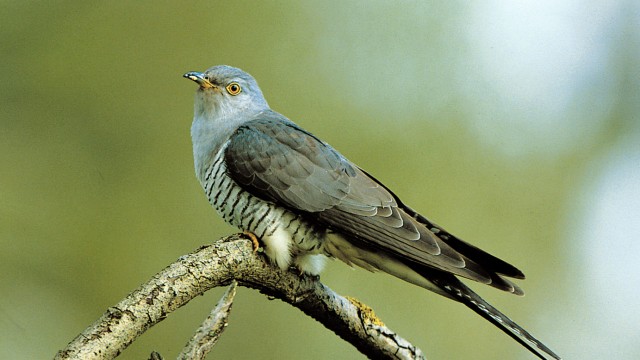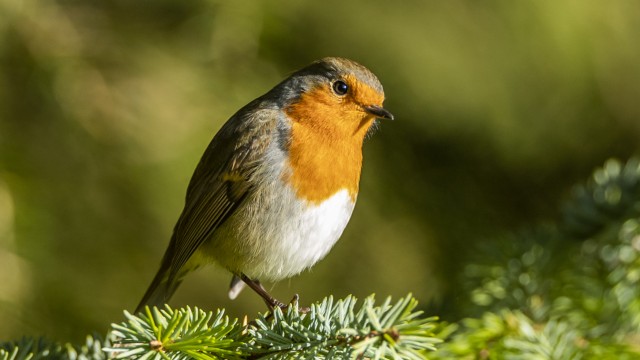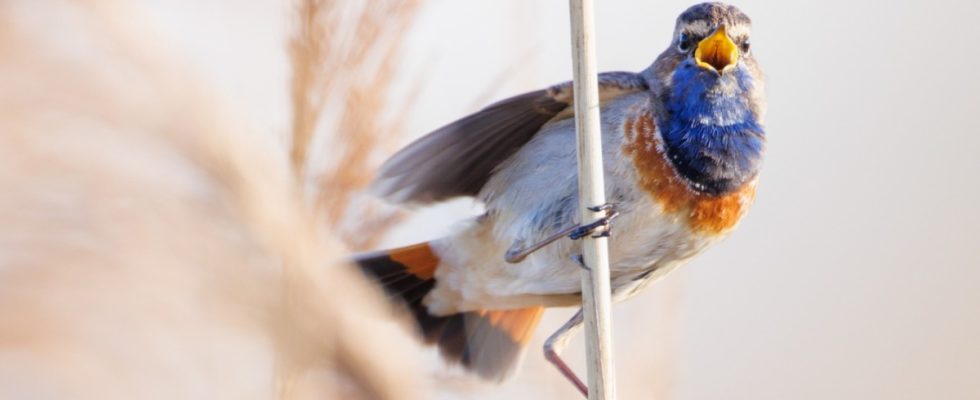Spring is a bit crazy at the moment because it appears much too early in its summer dress, which not only irritates people, but also the flock of birds. The mating season began with a vengeance in March, and since then it has been whistling and whistling in all corners of nature. Reason enough for a good 80 interested people of all ages to make their way to the Hofberg in Landshut early in the morning to explore the colorful world of bird songs on a hike. There are more than 250 species of birds in Germany, half of which are songbirds. But recognizing them by their singing is not that easy. So it’s high time to follow the heels of an ornithologist.
As soon as Philipp Herrmann started his bird song tour, some birds started fighting in a branch on the side of the path. On the one hand, there is a nuthatch, the only bird that climbs upside down down the tree trunk, as Herrmann explains. The blue-orange bird chirps – “wiüwiüwiü” – in front of a tree hollow, which displeases two blue tits. They make it clear that this cave belongs to them. Logically, you don’t just give up a place like this just because a nuthatch is spreading. They, the blue tits, feel that they are the rightful tenants of the great spotted woodpecker that nested here before them.
The nuthatch climbs upside down down a tree trunk.
(Photo: Lino Mirgeler/dpa)
What a splendid overture, the expedition through the Landshut bird world can continue like this. The Hofgarten is a spacious park whose slopes extend to the edge of the city center. The bird song tour marks the end of the Germany tour, which took the expert Philipp Herrmann alias Vogelphilipp via Berlin, Hamburg, Bonn, Stuttgart and Augsburg to Landshut. Which is practical because Herrmann grew up near here. Even as a boy, he observed birds on the Isar and Vils. Over the years, the trained landscape planner grew into an expert in bird identification.
While Herrmann is happily moving forward, the nuthatch doesn’t want to give in to the blue tits, these lightweights. But they complain and complain about murder. Their “tii-tii-tii” is followed by a kind of sharp trill with which they intend to drive away the enemy.
The song of titmice is varied, but Herrmann recommends starting with the chiffchaff when learning bird songs. The song of the gray songbird is easy to remember. He promptly does the hiking group the favor of getting in touch. It calls – similar to the cuckoo – its own name: “Chiffchaffchaff…” A smile plays on the faces of the hikers. It’s true: the sounds of birds make people happy in no time.

Philipp Herrmann has been organizing bird hikes as “Der Vogelphilipp” for more than 25 years.
(Photo: Alexey Testov)
Shortly afterwards, Herrmann draws attention to another sound. It comes from a wood pigeon that makes a somewhat muffled sounding “Tuutuutuu”. Sometimes, says Herrmann, a trick helps you memorize a bird’s song. Some sayings amazingly imitated the sound of the bird’s voice. In the case of the wood pigeon, the sentence is: “Listen carefully, Gudrun!” The blackbird’s song can be remembered with the following sentence: “Paris, Chérie, Paris! C’est la vie, Marie!”
“Unfortunately, we are currently experiencing a dramatic loss of the sound spectrum,” says Vogelphilipp, curbing the emerging euphoria. Fewer birds, fewer voices. A major problem is the loss of insects, i.e. aerial plankton. There is not enough food available to the birds.

The cuckoo conveniently calls its own name.
(Photo: P. Zeininger/dpa)
Now your eyes wander over to St. Martin’s Church. “One of the fastest birds in the world lives there,” says Herrmann. The peregrine falcons that nest in the church tower are bird hunters who spectacularly swoop down to grab their prey – often exhausted migratory birds. “However,” says the bird expert, “fewer and fewer migratory birds are flying past.” The remains of feathers from the captured animals not only reveal the kestrels’ diet, but also that the species they get hold of are becoming rarer.
But there are still migratory birds. Suddenly a swarm draws everyone’s attention. “These are redwings that are now flying to their breeding grounds in Northern Europe,” explains Herrmann as the group reaches a fenced enclosure where rheas are strolling. These ratites come from South America and have long necks. “They are direct descendants of the dinosaurs,” notes Herrmann, and the children also crane their necks.
In Bavaria, children on average know four of the twelve most famous bird species, especially woodpeckers and blackbirds. “The situation is different with dinosaurs,” says Herrmann with a smile. Many children can identify dozens of dinosaur species. For him, this is proof that you can get children excited about birds. Recognizing bird songs “does something to people,” says Herrmann. For anyone who deals with this, there is no going back. “The effect is similar to that of listening to relaxing music.”

The robin’s song can be roughly described as “dädädädädäd”.
(Photo: Danny Lawson/dpa)
Now Herrmann tries to attract a robin by imitating its song. The whole thing sounds something like “dädädädädäd”https://www.sueddeutsche.de/bayern/.”Sometimes it works,” he says, because the bird wants to tell the supposed rival: Nothing there, this is my territory.
When a bird sings, explains Herrmann, it not only reveals who and where it is, but also whether it is looking for a bride, whether something is wrong with it or whether it is warning members of its species of an enemy.
Now the birds have to overcome another challenge. The early start of summer particularly upsets meadow breeders. Because the grass shoots up at the beginning of April, the farmers start mowing earlier, which is why the lapwings give up their clutches prematurely. “It all doesn’t fit together anymore, we urgently need to do something about it,” says Herrmann at the end of the tour, which has certainly brought new friends to the bird world. But it has also raised awareness of how threatened nature is.
Until April 30th you can record bird songs via Whatsapp and send them directly to Philipp Herrmann (0151 / 290 686 00). In addition to his Instagram channel @dervogelphilipp, Herrmann regularly posts information on the Whatsapp channel “Vogelkunde”. More information about the bird song hotline and the Whatsapp channel on the website www.vogelphilipp.de.

